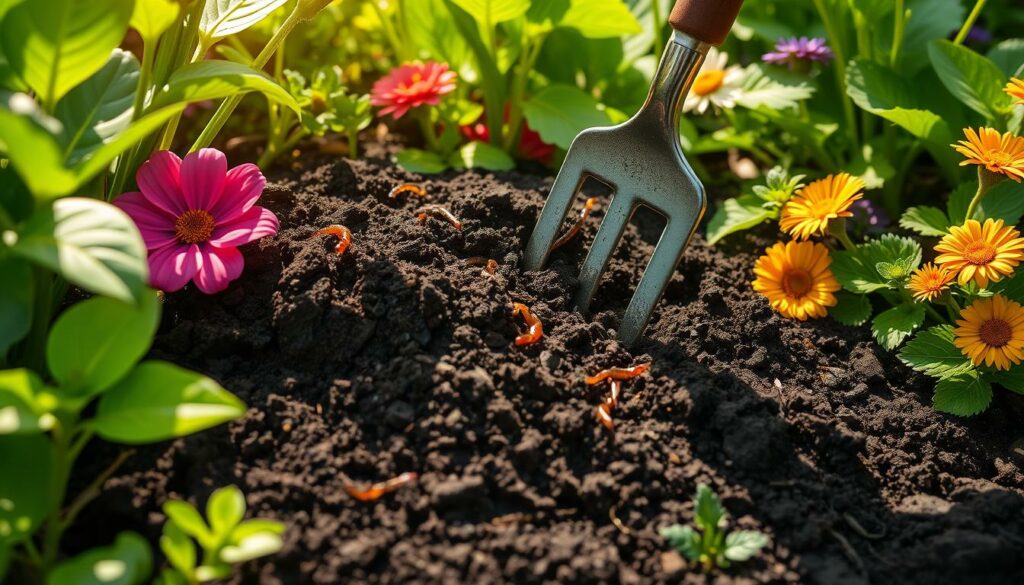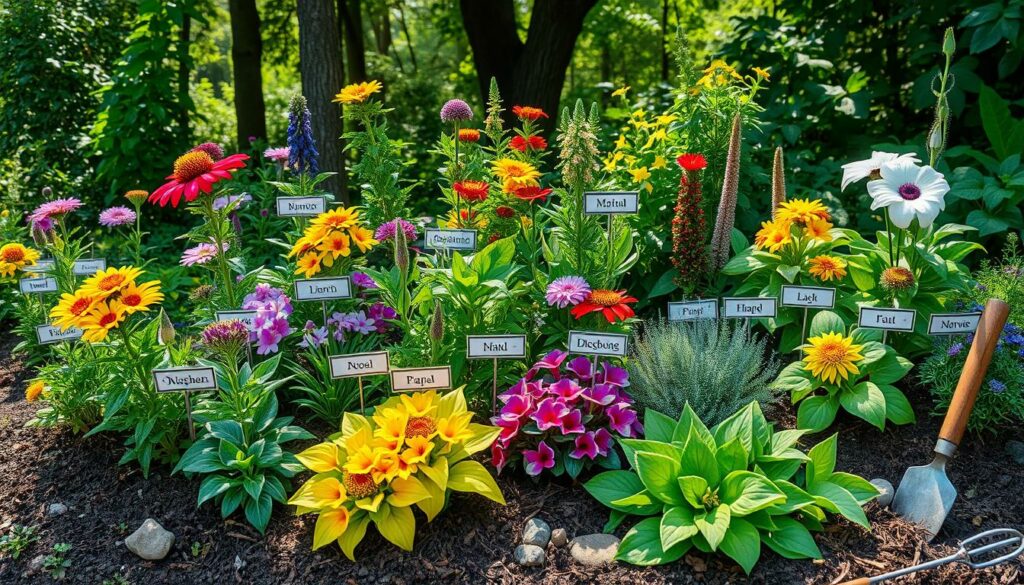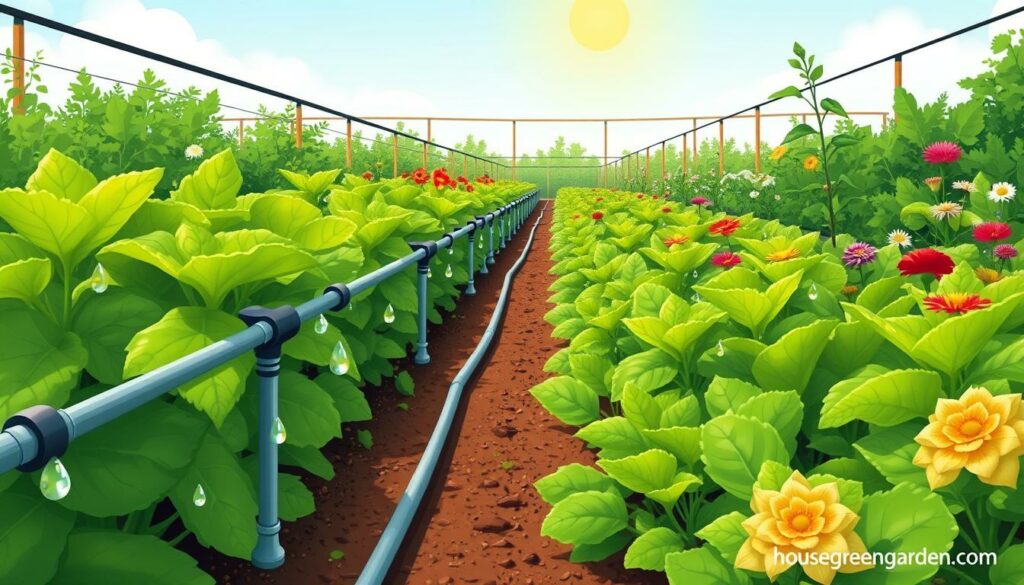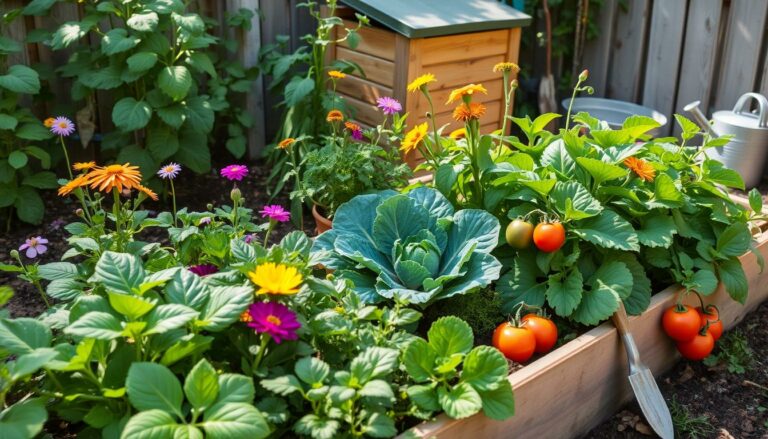One of the biggest perks of organic gardening is knowing what’s in your food. Growing an organic garden is simpler than you might think. Just follow the tips in this “organic gardening for beginners” guide, and you’ll soon enjoy a delicious harvest. Eating organic, garden-fresh meals will make you happy you became an organic gardener.
Key Takeaways
- Understand the basics of organic gardening, including composting, soil preparation, and companion planting.
- Learn how to effectively manage pests and diseases using organic methods.
- Discover the benefits of seed starting and crop rotation for a thriving organic garden.
- Explore mulching and raised beds as ways to enhance your organic gardening experience.
- Gain the knowledge to grow a bountiful organic garden at home.
Select the Ideal Garden Site
Choosing the right spot for your organic garden is key. Success depends on sunlight and water access. These factors help your plants grow well and give you plenty of harvests.
Sunlight and Water Access
Look for a spot that gets 6 to 8 hours of direct sunlight daily. Plants like tomatoes and squash need full sun to grow well. Stay away from big trees or structures that block sunlight.
Having easy water access is also important. You might need a hose, rain barrel, or a watering can station. This is especially true during hot, dry times when plants need more water.
Container Gardening for Small Spaces
Even with little outdoor space, like a balcony or small patio, you can still grow your own food. Container gardening is perfect for city living or small yards. Use pots, planters, and raised beds to make a garden in tight spots.
For a container gardening setup, pick a spot close to your kitchen. An herb garden outside your door is great. It lets you grab fresh ingredients easily for your cooking.
Prepare the Soil for Optimal Growth
Starting an organic garden means first preparing the soil for growth. Good soil is key for strong roots and healthy plants. Here’s how to get your soil ready:
- Begin a compost pile to add organic matter to the soil. As it breaks down, it will give your garden the nutrients it needs.
- Add Miracle-Gro® Performance Organics® All Purpose In-Ground Soil. It’s made with aged compost for extra fertility.
- For containers, use Miracle-Gro® Performance Organics® All Purpose Container Mix. Make sure your pots have holes for water to drain.
By preparing the soil with compost and nutrients, you set your garden up for success. It will grow well and give you plenty of food all year.
| Soil Preparation Essentials | Benefits |
|---|---|
| Compost | Enriches soil with organic matter and essential nutrients |
| Miracle-Gro® Performance Organics® All Purpose In-Ground Soil | Provides a nutrient-dense foundation for in-ground gardens |
| Miracle-Gro® Performance Organics® All Purpose Container Mix | Ensures optimal growing conditions for container-based plants |
“Healthy soil is the foundation of a thriving organic garden. Take the time to prepare it properly, and your plants will reward you with abundant growth and bountiful harvests.”

Choose Plants Suited to Your Region
When planning your organic garden, picking Plant Selection that fits your area is key. Bonnie Organics has a variety of Native Plants and Disease-Resistant hybrids. These plants need less care and give you more to harvest.
Native and Climate-Adapted Plants
Native plants fit your local climate and soil perfectly. They’re tough and need little care. By choosing Native Plants, you help your garden and local wildlife.
Disease-Resistant Hybrid Varieties
Hybrid varieties are also great. They’re bred for better health and more food. Bonnie Organics has these, making your garden easier to manage.
Plant a mix of flowers and herbs to draw in pollinators. They keep your garden healthy.

Water Wisely and Efficiently
Proper watering is key for your organic garden’s health and growth. Finding the right balance is important. Too much or too little water can harm your plants. Check the soil moisture before deciding when to water.
When it’s time to water, aim the moisture at the base of the plants. This lets the roots absorb the water they need. Drip irrigation is a great way to do this. It delivers water slowly and precisely, reducing waste and ensuring your plants get enough water.
- Check soil moisture before watering to avoid over-or under-watering
- Water at the base of plants to allow roots to absorb moisture
- Consider using a drip irrigation system for targeted, efficient watering

Watering wisely and efficiently helps your organic garden thrive. Smart watering practices, like drip irrigation, ensure your plants get the right amount of water. This leads to better growth and health.
Provide Organic Fertilizers
Keeping your garden healthy is more than just watering and sunlight. Plants need nutrients to grow well. That’s why organic fertilizers are important.
Organic fertilizers, like Miracle-Gro® Performance Organics®, offer natural nutrients. They give plants the nitrogen, phosphorus, and potassium they need. These fertilizers release nutrients slowly, giving plants energy all season.
- Nitrogen makes leaves green and healthy
- Phosphorus helps roots grow strong and flowers bloom
- Potassium boosts plant health and fights off diseases
Miracle-Gro® Performance Organics® Edibles Plant Nutrition is great for your garden. It’s made for vegetables, herbs, and fruits. Just follow the package to give your plants a nutrient boost.
“Organic fertilizers are a game-changer for gardeners looking to grow the healthiest, most productive plants possible.”
Using organic fertilizers helps your plants get the nutrients they need. Choose a good organic fertilizer like Miracle-Gro® Performance Organics® for the best results in your garden.
Organic Gardening Basics: Mulching and Weed Control
Starting a lush, vibrant organic garden needs a smart plan for weeds and soil health. At the core is mulching. It fights weeds, keeps soil moist, and adds nutrients over time.
For mulching, you can use pine straw, wheat straw, grass clippings, leaves, and wood. These organic mulch types block sunlight, stopping weed seeds from growing.
- Organic mulch also keeps soil moist, cutting down on watering and boosting plant roots.
- As it breaks down, it adds nutrients to the soil, making it richer and supporting your garden’s health.
Along with mulching, pulling weeds by hand is key. This lets you pick which plants to keep, without harming your other plants.
Using organic mulch and careful weed control makes your garden grow well. It does so without harmful chemicals.
Practice Crop Rotation
One of the best ways to protect your organic garden is to practice crop rotation. This means moving different plants to different spots each year. It stops pests and diseases from coming back to the same plants.
Crop rotation is key for organic pest control and disease prevention. Growing different crops helps break the life cycles of pests and diseases. This keeps your garden healthy and balanced.
There are many ways to do crop rotation. You can group vegetables by family and move them around each year. Or, you can follow a specific order like Leaf-Fruit-Root-Legume.
Choosing any crop rotation system helps. It reduces pests and diseases in your garden. Even a simple rotation can make a big difference.
“Any form of crop rotation, even if basic, is better than none.”
By using crop rotation, you can manage pests and diseases well. It also helps plants stay healthy and the soil fertile. Crop rotation is a simple yet powerful tool for organic gardeners.
Maintain Garden Hygiene
Keeping your garden clean is key for Garden Hygiene, Pest Control, and Disease Prevention. Regular care makes your garden look better and keeps your plants healthy.
First, remove any sick leaves or plants. Throw them away to stop infections from spreading. Check your plants often for pests or diseases. Act quickly if you find any problems.
- Wipe gardening tools clean with a disinfecting cloth after each use. This stops diseases from spreading.
- Get rid of fallen leaves, weeds, and other debris. This helps keep pests and diseases away.
- Try organic pest control methods. Use beneficial insects or natural repellents to keep your garden balanced.
By focusing on garden hygiene, you can make a beautiful, sustainable outdoor space. A clean garden is a happy, healthy one.
“Healthy soil is the foundation of a successful organic garden. By focusing on soil health, you can create an environment that is naturally resistant to pests and diseases.”
Conclusion
Growing an organic garden lets you enjoy fresh, chemical-free food right in your backyard. By following the tips in this guide, you’ll grow a lot of healthy food. Using organic gardening practices helps the environment and keeps your family safe.
Sharing meals made with your own organic produce will make you feel proud. Growing your own food connects you to nature and its cycles. Enjoy the joy of caring for your garden and the taste of your own, chemical-free food.
Organic gardening works in any space, big or small. It makes your garden a green oasis. Start this journey for your health and the planet’s. Discover the happiness of growing your own organic food.
FAQ
What are the biggest perks of organic gardening?
What should you consider when choosing a garden location?
What is key to a successful organic garden?
What types of plants should you choose for an organic garden?
How can you water your organic garden efficiently?
How can you provide organic fertilizers to your plants?
How can you control weeds in an organic garden?
Why is crop rotation important in an organic garden?
How can you maintain good hygiene in the organic garden?
Source Links
1 . Organic Gardening for Beginners | How to Start a Garden
2 . How to Start an Organic Garden for Beginners
3 . Organic Gardening 101: How to Start Gardening Organically
- Growing Bonsai: Tips for Miniature Tree Enthusiasts
- Buying Bonsai: Tips for Selecting Your Perfect Tree
- Bonsai Potting: Essential Tips for Tree Care Success
- Bonsai Maintenance: Essential Care for Tiny Trees
- Mastering the Art of Shaping Bonsai: A Beginner’s Guide


